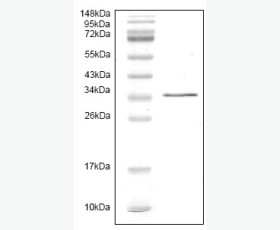Recombinant Human C-X-C Motif Chemokine 4/CXCL4/PF4
| Product name: | Recombinant Human C-X-C Motif Chemokine 4/CXCL4/PF4 |
| Source: | E.coli |
| Purity: | Greater than 95% as determined by reducing SDS-PAGE. |
| Buffer Formulation: | Lyophilized from a 0.2 μm filtered solution of 50mM TrisHCl, 150mM NaCl, pH 8.0. |
| Applications: | Applications:SDS-PAGE; WB; ELISA; IP. |
| Storage: | Avoid repeated freeze/thaw cycles. Store at 2-8 oC for one month. Aliquot and store at -80 oC for 12 months. |
| UOM: | 100ug/50ug/200ug/1mg/1g |
| Source | E.coli |
| Description | Recombinant Human C-X-C Motif Chemokine 4 is produced by our E.coli expression system and the target gene encoding Glu32-Ser101 is expressed. |
| Names | Platelet Factor 4, PF-4, C-X-C Motif Chemokine 4, Iroplact, Oncostatin-A, PF4, CXCL4, SCYB4 |
| Accession # | P02776 |
| Formulation | Lyophilized from a 0.2 μm filtered solution of 50mM TrisHCl, 150mM NaCl, pH 8.0. |
| Shipping |
The product is shipped at ambient temperature. |
| Reconstitution |
Always centrifuge tubes before opening. Do not mix by vortex or pipetting. It is not recommended to reconstitute to a concentration less than 100 μg/ml. Dissolve the lyophilized protein in ddH2O. Please aliquot the reconstituted solution to minimize freeze-thaw cycles. |
| Storage |
Lyophilized protein should be stored at < -20°C, though stable at room temperature for 3 weeks. Reconstituted protein solution can be stored at 4-7°C for 2-7 days. Aliquots of reconstituted samples are stable at < -20°C for 3 months. |
| Biological Activity |
ED50 is 5-15 μg/mL. |
| Purity |
Greater than 95% as determined by reducing SDS-PAGE. |
| Endotoxin | Less than 0.1 ng/µg (1 IEU/µg) as determined by LAL test. |
| Amino Acid Sequence |
EAEEDGDLQCLCVKTTSQVRPRHITSLEVIKAGPHCPTAQLIATLKNGRKICLDLQAPLYKKIIK KLLES
|
| Background | Human Chemokine (C-X-C motif) Ligand 4 (CXCL4) is expressed in megakaryocytes and stored in the alpha-granules of platelets. CXCL4 contains several heparin-binding sites at the C-terminal region and binds heparin with high affinity. The active CXCL4 protein is a tetramer. Human and mouse CXCL4 share 64% sequence identity. CXCL4 is chemotactic for neutrophils, fibroblasts and monocytes and plays a critical role in inflammation and wound repair. CXCL4 functions via a splice variant of the chemokine receptor CXCR3, known as CXCR3B. The major physiologic role of CXCL4 appears to be neutralization of heparin-like molecules on the endothelial surface of blood vessels, thereby inhibiting local antithrombin III activity and promoting coagulation. In contrast to other CXC chemokines, CXCL4 lacks chemotactic activity for polymorphonuclear granulocytes. |














